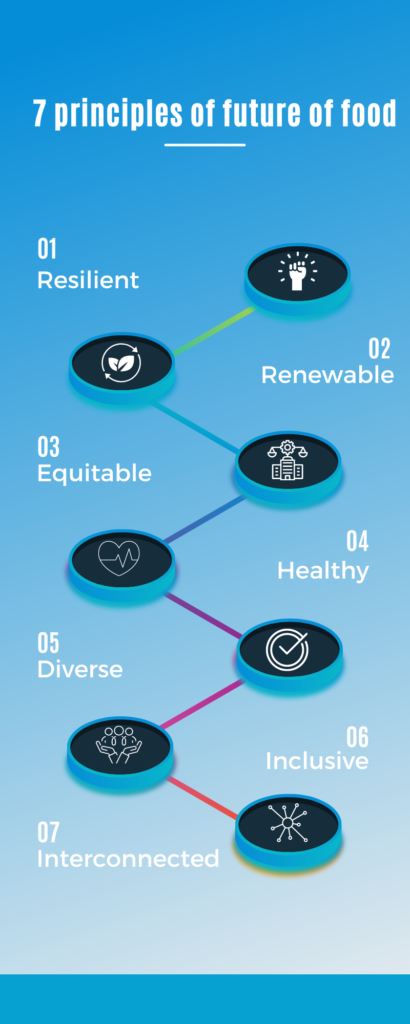Contact: +91 99725 24322 |
Menu
Menu
Quick summary: The year 2022 was a challenging year for the global food system. Many weaknesses were unearthed in the wake of weather extremities, supply chain disruptions, geo-political tensions and food wastage. We need healthy ecosystems, rich soils and clean water for the future generations and the role of technology and innovation is imminent for future proofing our food systems. With Climate Smart agriculture and Nature Tech solutions food systems can provide 37% of climate mitigation required to reach the 2030 goals.

Climate Change is a looming crisis that needs urgent attention. Food systems are equally entwined in this crisis that has resulted in reduced agriculture productivity, supply chain disruptions, pressure on livelihoods and has affected food and nutritional security for millions. Food production is a major driver of climate change and nature loss, accounting globally for 25 % of GHG emissions, 90% of land-use change and 70 % of water usage.
The year 2022 was a challenging year for the global food system. Many weaknesses were unearthed in the wake of weather extremities, supply chain disruptions, geo-political tensions and food wastage. 2022 saw the global food prices reaching an all-time high, with fuel prices spiking 86% and fertilizer prices shooting up 35%. 2.4 million people were severely food insecure. 2022 was the year of unprecedented hunger and supply chain disruptions due to the Ukraine war. Climate catastrophes paralyzed the earth in 2022. Floods, hurricanes, wildfires, droughts, heatwaves were few of the climate disasters that rattled the world. Food security zoomed past pre-pandemic levels in war-torn places and those wrecked by climate disasters.
Food systems are contributors to climate change and are also impacted by the same. Agriculture, Forestry and Land Use (AFOLU) is currently the only sector that has the potential to become an emission sink, pulling out more carbon from the atmosphere than emitting it. Transformation of food systems requires policy reforms, investments and technology enablers for environment.
Food finally arrived at COP27 held at Egypt in 2022. It was an opportunity to stress the importance of building sustainable, resilient and equitable food systems globally. It made its way into the main agenda with important developments
The global food policy report charted out these 6 policies
Value chain digitization, genome editing, solar power for irrigation and cold storage have the potential to reduce emissions and enhancing productivity to combat the hunger and climate challenge. There is a need to increase the adaptation and adoption of these innovations to meet the objectives. Increase in investments and incentivization is essential.
40 % of the world’s population cannot afford a nutritious diet. Countries need to adopt healthier diets and support changes in food environment like certifications, food standards and edging consumers to adopt sustainable diets.
Climate change affect the entire food supply chain right from production to consumption. Investments in climate smart practices all through the supply chain along with cutting down on food wastage and loss builds a resilient supply chain.
Food systems transformation calls for a wise management of natural resources including land, water and energy. Integrated land management drives sustainable resource management. Promotion and adoption of sustainable practices of crop management, water management, soil management ensures equitable access to natural resources. Incentivization in these areas will motivate stakeholders to invest in sustainability.
As per estimates $350 billion is required annually to meet the climate related goals for food systems. R&D in green innovations, incentivizing farmers, attract consumers to make healthy and sustainable food choices and introduction of green bonds are few of the recommendations.
Inclusivity has to be embedded at all levels.The transformative reforms and innovations should be accessible to the rural populations, minority groups and women. Social protection helps them to manage climate risks and build resilience to provide better livelihoods. Climate change adaptation and mitigation calls for strengthening the productive capacity of these people and encourage them to adopt sustainable practices.
According to Andy Zyanga, CEO of EIT,
“Innovation is critical for the transformation of food systems and one of the best ways to generate societal and economic impact.”
We need healthy ecosystems, rich soils and clean water for the future generations and the role of technology and innovation is imminent for future proofing our food systems. Climate smart technologies, regenerative agriculture, carbon farming are few of the opportunities for food systems to work with nature and accelerate the decarbonization path. The role of tech is important in improving transparency and accountability in monitoring supply chains and enhancing the integrity of carbon markets.
To meet the nutritional needs of 9.8n billion people by 2050 there are a number of factors to be addressed
Nature based solutions like soil health, water management and agroforestry provides means to boost productivity while mitigating the climate challenges. Efficient fertilizer use, crop diversification, nutrient management and cover cropping helps to adapt to climate change.
Ending deforestation and land conversion is critical to address the climate crisis. Enabling traceability in commodity value chains and increasing the monitoring capabilities are few of the interventions required.
Adoption of Industry 4.0 technologies with Big data, IoT and blockchain improves value chain linkages and supply chain transparency. Innovations like alternate proteins, food sensing technologies aid in these actions.
Post-harvest losses need to be reduced considerably with better management of processing, storage and handling. Drive traceability with better multi stakeholder partnerships resulting in greater visibility and accountability in the supply chains. There should be an awareness drive amongst consumers to shift to sustainable diets and avoid food wastage.
Building a circular economy is important to support the growing population. Sustainable food systems where the production, consumption and disposal benefits the people and environment is critical.
Nationally Determined Contributions (NDCs) are at the heart of climate action and integrating food system transformations into this is important to deliver biodiversity, food security and social goals. Context specific solutions for food production, distribution, consumption and disposal builds resilience into the ecosystem. However, food systems have never been prioritized so far.
Food systems encompass the entire actors and the linkages in the value chains involved in production, aggregation, processing, distribution, consumption and disposal of food products that originate from agriculture, forests and oceans and form a part of nature. There is a need to maximize synergies towards climate, health and the sustainable development goals (SDGs).

TraceX has been working with farmers, industries, brands and export houses building traceable and sustainable supply chains. It harnesses the power of blockchain to build resilient solutions for the food ecosystem. The farm management solutions Trace Gro and Trace Pro provide the supply chain management and food safety empowering brands with trust and transparency. TraceX is also foraying into Carbon management with Trace Carbon, a decarbonization platform and building a DMRV tool for high quality Carbon Credits in the Voluntary Carbon market.
Though 2022 saw an emergence of importance of food production for the planet, there is a lot to be done in protecting and reclaiming the earth’s ecosystems from the climate changes. Food systems are linked to many global challenges from hunger to deforestation to being the largest emitters of GHGs and we need to soon realize the true potential of transforming these food systems towards net-zero and nature positive systems protecting the people and the planet. With Climate Smart agriculture and Nature Tech solutions food systems can provide 37% of climate mitigation required to reach the 2030 goals.

Ushering in 2023 with the promise of building food systems for people, planet and prosperity.